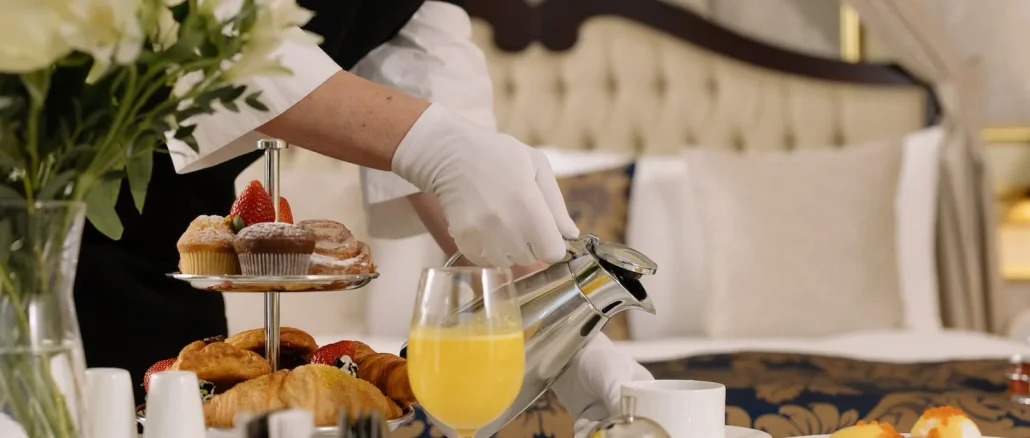
The strikedown of the Joint Labour Committee is having lasting effects on the hospitality industry, with opposition parties waiting to see “real action” from the government.
Opposition parties and trade unions are calling out the Government and hospitality groups for their lack of action to reinstate a Joint Labour Committee (JLC), which would prevent the exploitation of workers.
The JLC protects workers in terms of pay, sick leave and outlines regulation. With no protection from JLCs, this has left workers more exposed to exploitation.
Since the strikedown of the JLC for the hospitality industry, there have been heightened reports of verbal and financial abuse occurring within the sector, which employs over 260,000 people in Ireland, according to figures from Deloitte.
“Where we are now is that the JLC has been shelved and sitting on a shelf, and young people particularly, are treated horrendously,” Denis Hynes, SIPTU representative for hospitality said.
Hynes added that “you have workers who are being treated horrendously, they are not getting tea breaks. There is supposed to be a break between shifts of eleven hours, they don’t get it. They are not getting paid premiums. They don’t get proper holiday pay,” adding that employer bodies are “trying to drive down pay and conditions”.
Response
The CEO of the Restaurants Association of Ireland (RAI), Adrian Cummins said the Association does not “see the need for Joint Labour Committees in light of Ireland’s strong and robust legislation protecting employee’s rights”.
In a statement, a spokesperson for the Department of Enterprise, Trade and Employment said that hospitality workers “enjoy a variety of statutory protections, such as minimum wage, organisation of working time and terms of employment, which are applicable to all employees in Ireland”.
Despite these statements, opposition parties claim there are reports of abuse in the hospitality sector and that there is not enough being done to protect employees.
“They’re very high-pressure environments, where the power differential between the manager and worker is very large. I’m sure abuse is pretty rife. Like there were very widespread instances of people’s tips in the hospitality industry,” People Before Profit TD Paul Murphy said.
“The most immediate blame has to sit with the employers who allow this to happen.
“99 per cent of the time the abusers get away without any repercussions which is an issue” Murphy added.
A recent study by Deirdre Curran, titled ‘Inside-Out Hospitality’, found that 67% of hospitality workers surveyed faced verbal abuse, 64% psychological abuse, and 15% physical abuse.
Abuse
Naoise Murphy Lynch (21) has been working in hospitality since she was 19.
In Murphy Lynch’s previous workplace, there was an ongoing joke between staff that lunch breaks “weren’t a thing”. The options for the workers were to eat whenever they had the chance, but “there was no sit-down lunch ever”, resulting in the staff’s exhaustion.
“As well as the lack of breaks within the company, there were also promises of pay rises and bonuses that were not followed through,” she said.
In February this year, Ms Murphy Lynch had been promoted to a bigger role which saw her become the “barista, waitress, cook, kitchen porter, and cleaner”.
“If I was to get a break, and I use that word really lightly, it would be maybe 5 or 10 minutes sitting outside within those 13 hours, usually, because I thought I was going to faint from exhaustion, and I would have to step outside to get some air.”
“I feel like a lot of young people in hospitality really need to realise that feeling like you might faint from exhaustion is not a normal part of working a minimum wage job,” Murphy Lynch said.
After a complaint over the JLC’s protection from fast food franchises, the High Court declared it unconstitutional in 2011. The JLC was expected to be improved and reinstated the following year, but the Industrial Relation (Amendment) Act replaced it, leaving legal needs unfulfilled.
Hospitality JLC
When asked if hospitality workers would be less vulnerable if a JLC was put back in place, Labour TD Ged Nash said “without a shadow of a doubt,” adding, “We don’t have a functioning system for the hospitality sector, it’s a sector that’s addicted to low pay”.
In 2012, Nash and former Fine Gael Minister for Jobs, Richard Bruton redrafted legislation that clarifies the procedure for forming a Joint Labour Committee. This legislation was signed into law in the middle of 2012, but has yet to be used.
Nash explained that without the existence of a JLC, “there will continue to be problems with retention of good staff”, “limited opportunities for career advancement” and “exploitation of low wages”.
He added that better standards can be introduced through regulation of a joint labour committee, “which benefits everybody in the end”.
The Government is being criticised by opposition parties and trade unions for their failure in reinstating a JLC in 2012 that would prevent further abuse in the hospitality sector. Nash said that hospitality is a difficult industry, one “that especially needs better governance”.
“The government has sat by and has issued a lot of tea and sympathy to the hospitality sector in terms of what they’ve gone through in terms of COVID or whatever else,” Labour Senator Marie Sherlock said.
Sherlock added that “they’ve said very little to hospitality workers and the government have waved around their tips bill as being the great Messiah saviour for hospitality workers.”
Tips bill
The Payment of Wages (Amendment) (Tips and Gratuities) Act 2022, was signed on the 20th of July last year and it came into effect on the 1st of December.
This means that any ‘service charge’ should be fairly distributed. Employers are now bound by law to show ways in which tips are shared.
Nadia Mielcarek (21) highlights tip abuse that she faced whilst working in hospitality.
Mielcarek describes the tipping system her employers established. A number between one and ten was assigned to each employee.
“I was a 5, but if they found out that you told someone else, they’d mark you down one. So basically you’re getting 50% of your tips that you made and they were taking the other 50%.
“They said through good work and consistency you get put up on the tip rank but you never did and it was just a way to take tips off you”, Mielcarek added.
Clement Shelvin, a spokesperson for ONE Galway, has campaigned on the issue of tips since 2018.
“This legislation is a good start on improving conditions and the lives of workers in the hospitality sector. But we mustn’t stop there. We’d urge the government to give hospitality workers a real meaningful gift this Christmas by tackling the inequities and bad practices in the industry”, Shelvin said.
Tipping legislation is welcomed by employees, but the future of the hospitality sector is still uncertain. People are becoming less interested in working in the sector as a result of labour shortages, poorer working conditions, and increased abuse.
Fáilte Ireland figures show that 40,000 vacancies exist in the tourism and hospitality industry.
Opposition parties
Opposition parties are determined to get the industry back up and running. Paul Murphy is working on passing a bill “to give workers the right to clean air in the context of COVID”.
“In general it’s a good thing for workers to have. The government really failed to do anything on it,” Murphy said.
Conditions are beginning to be reviewed, including the recently passed Tips and Gratuities Act. Additionally, the government must comply with a directive from the EU on collective bargaining within the next two years.
Senator Sherlock explained that “the government has failed completely in terms of helping workers”.
Sherlock also said she is hopeful that a JLC will eventually be established for the hospitality sector.
“I believe that someday we will have hospitality employers sitting around the table with trade unions representing workers in the sector. It could take a period of time, but we can’t lose sight of that goal of ensuring that workers need to have a voice in deciding their pay and conditions.”
She added that it is “critical to a more productive workforce, better service within the sector, greater retention of staff and all those issues.”
Senator Sherlock said it is essential for workers and trade unions to speak up to get conditions improved in the sector.
“We absolutely have to act now. We have to put it up to the government now. To make sure that workers’ voices are represented, that people’s livelihoods are helped,” Sherlock said,“people can’t afford to work within the hospitality sector.”
When contacted about the matter, the Irish Hotels Federation failed to respond.
Matthew Joyce, Louise Hickey, Ceri Doyle, Conor McKeever, Lauren Finglas



